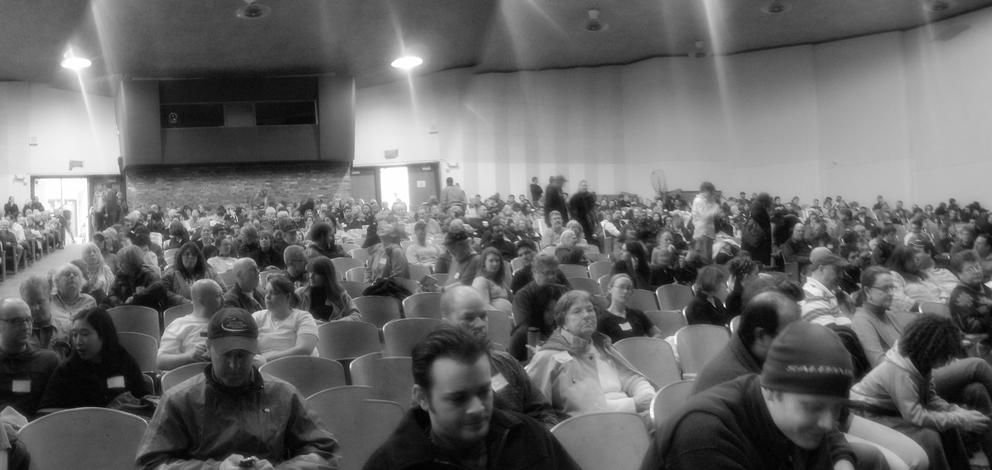When it comes to presidential elections, the “Evergreen State” of Washington might as well take on a different nickname: the Everblue State, perhaps. Since 1988, the year Michael Dukakis suffered a brutal Electoral College defeat to George H. W. Bush, Washington has faithfully voted to send a Democrat to the Oval Office. Barring any unforeseen blunder by this year’s eventual nominee, so it shall be this time as well. But the state’s steady progressivism in national elections, unremarkable as it may seem, doesn’t preclude periodic clashes of liberal partisans, laying bare the principled divisions among the local left.
Consider this primary season and the growing potency of Bernie Sanders’ democratic socialism. For many, his unrelenting critique of Wall Street and the billionaire class has served as a popular alternative to the impressive establishment credentials of Hillary Rodham Clinton. His primary win in Michigan – one of the biggest upsets in modern history – reinforced this point. Although his chances of securing the nomination remain slight, the fight to shape the nation’s progressive policy agenda rages on.
And it’s coming to the Northwest tomorrow, when the Democratic caucus kicks off in full frenzy.
Delegates are key to securing the nomination, and states have different ways of allocating them. In Washington, the party uses a system called precinct caucuses, which loosely translates to neighborhood-level meetings. The decision is rooted partly in preference: Washington Democrats like the idea of having friends and neighbors come together to talk shop about the country’s political climate.
“It’s not often in our life anymore that we actually meet with folks face to face and discuss the big challenges facing our nation and what we should do to tackle them,” says Jamal Raad, communications director for the Washington State Democrats.
But at the caucus this Saturday, Democrats won’t really be voting for president; our delegate count won’t change the race’s dynamics either way. They’ll be voting for principles. If you’re like me – torn between what Sanders’ messages around politics and capitalism could mean for the future of American progressivism, and what Clinton’s centrism might be able to achieve given a Republican-dominated Congress – perhaps we should join the fray. If nothing else, tomorrow will present a rare moment where the delineations on the left, in our deep blue state, are made much clearer.
Either Clinton or Sanders will likely face off against Donald Trump, the bombastic demagogue on the way to securing his party’s nomination, barring an extremely rare mutiny at their party convention – rare, at least, in the modern age. The stakes here aren’t small, and the battle lines have been revealing themselves for some time now. Popular State Senator Pramila Jayapal and Kshama Sawant, the socialist Seattle City Council member, have both endorsed Sanders. On Tuesday night at Rainier Beach High School, Mayor Ed Murray and his husband Michael Shiosaki introduced Clinton to a booming rally of supporters.
Morgan Beach, a precinct captain and recent city council candidate, says some people will treat the caucus as an opportunity to politely discuss politics. But some diehards “who are super hardcore” might snub civility and unleash the full fury of their ideological convictions, she says. As political passions rise, Beach says things can reach “an intense level of democracy” that some people “can’t handle.”
“It’s a sad consequence of politics sometimes,” Beach says, referring to the hostility between different factions of the Democrats that she’s experienced. “At the same time, if you really believe that democracy is out of your control, it’s not. You just didn’t show up to caucus.”
While the caucus gives party activists more influence in determining their champion, Raad says the day is not solely about choosing the next Democratic candidate. Amid the hustle and bustle of caucus proceedings, political organizers will be rallying support for other progressive issues, like the statewide minimum wage hike, and Governor Jay Inslee and Senator Patty Murray’s reelection campaigns.
According to the Party’s rough estimates, over 100,000 voters (nearly 70,000 have already pre-registered) from some 7,000 precincts will meet in nearly 500 rooms, libraries, schools and churches statewide to participate in the Democratic showdown. (See here to determine your caucus location). If it hasn’t already been handled, there will be opportunity to register and formally declare yourself a Democrat on-site to participate, both prerequisites for caucusing.
Game time starts at 10 a.m., but Party officials suggest showing up earlier, especially if you have paperwork to fill out.
For those debating whether or not to participate – and there are many, at least in my circles – Raad had this to say: “The caucuses are only every four years,” he says. “It’s a community meeting that is a great organizing tool for Democrats across the state to strategize and organize on how we’re going to win these elections in November.”
For her part, Beach says she will attempt to conduct a civil meeting. It’ll play out something like this: There will be a first round of debate, hearing from both Sanders and Clinton advocates. Then a vote is called. The tally is shown. The debate recommences. At that point the loyalists of each candidate will unleash their best arguments on those still undecided. Finally, a last vote is called, and a winner is determined.
Washington has a total of 118 delegates provided by the Democratic National Committee, a number determined by population and party loyalty in previous elections. 101 of them are so-called “pledged delegates,” allocated proportionally to each candidate depending on their support.
How are they likely to split? Clinton’s camp has admitted that the senator from Vermont seems to have the upper hand. Here twice already this week, Sanders will be back in Seattle this afternoon for a rally at Safeco Field, singing his thunderous populist tune and hoping to solidify his winning prospects. But the Clinton forces, quiet as they may seem, are bracing for the long haul. Although the frontrunner’s delegate count nears 2,383, the amount needed to secure the nomination, she’s not letting up.
Tomorrow, in one of the country’s most liberal states, these two progressive visions for the future will take center stage. You won’t want to miss this show.
--
To find your caucus site, visit: https://www.demcaucus.com/register



